ZANU PF 2018 Elections Manifesto
1 like1,896 views
ZANU PF 2018 Elections Manifesto launched at the Harare International Conference Centre in Zimbabwe on 4 May 2018
1 of 78
Downloaded 22 times
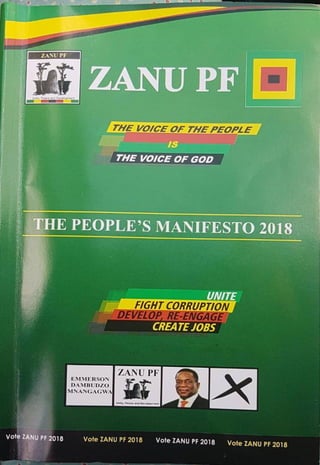

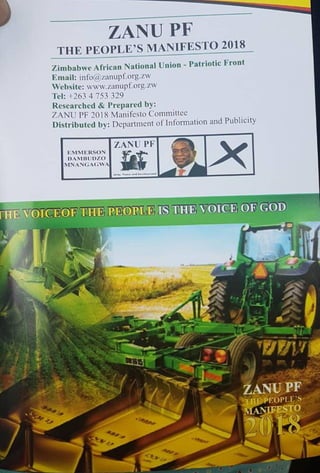
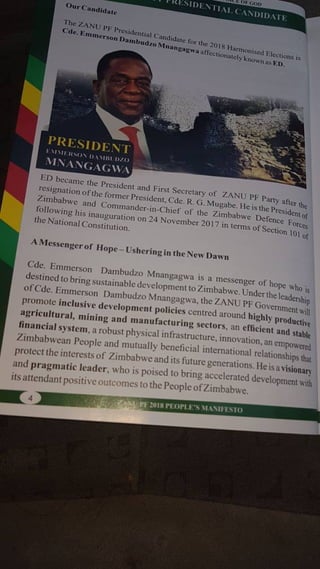
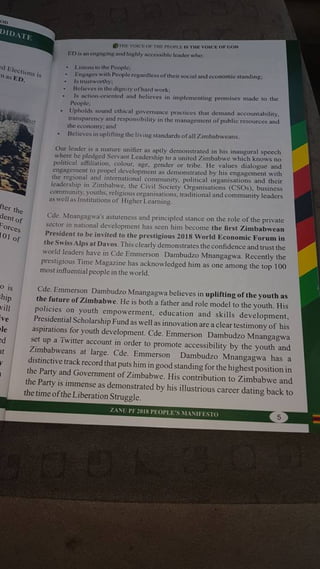
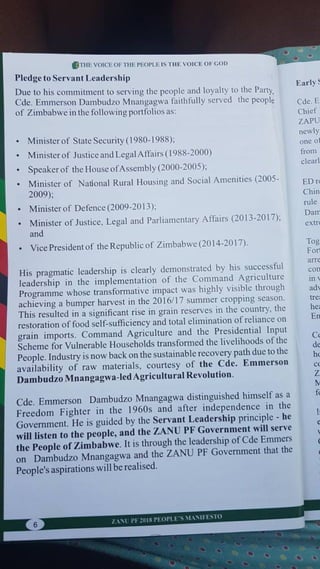
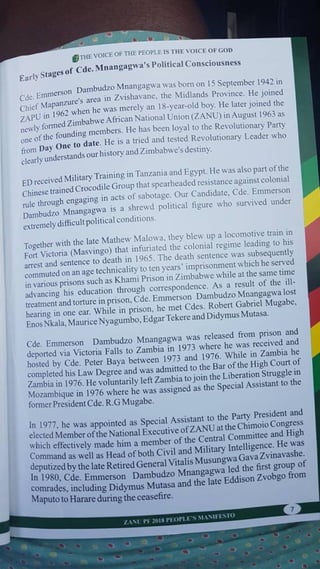
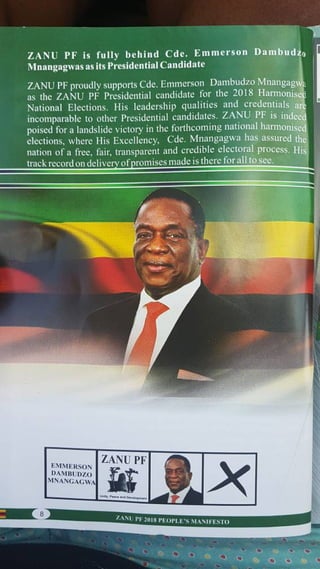
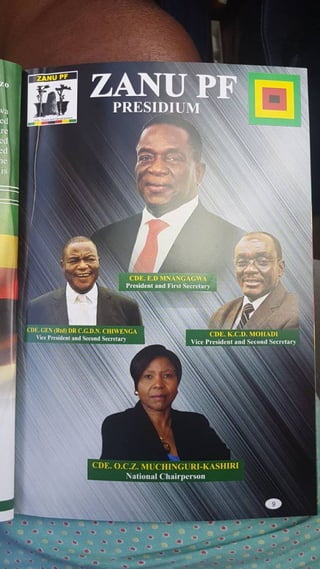
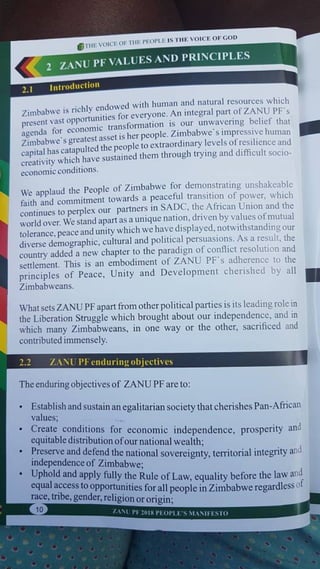
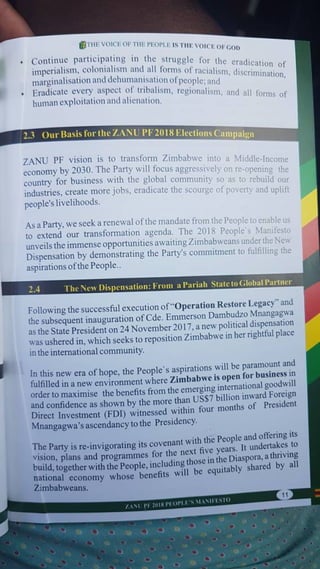
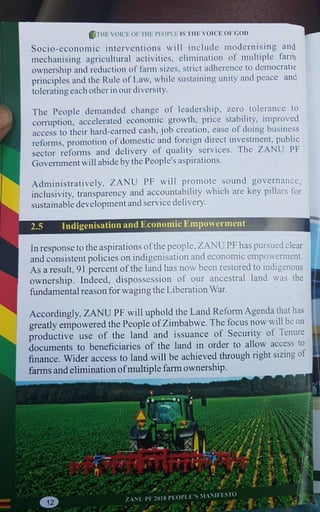
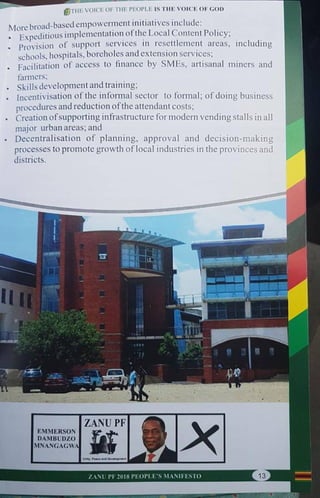
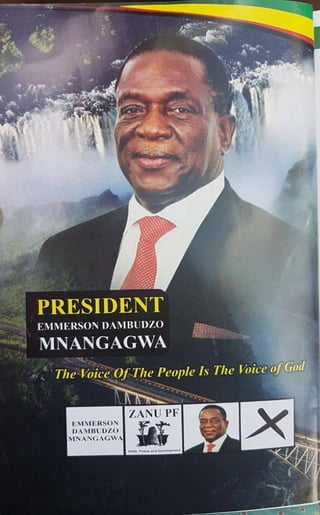


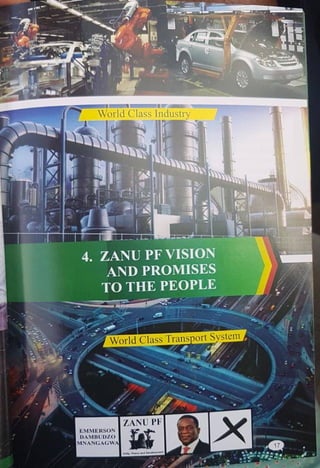
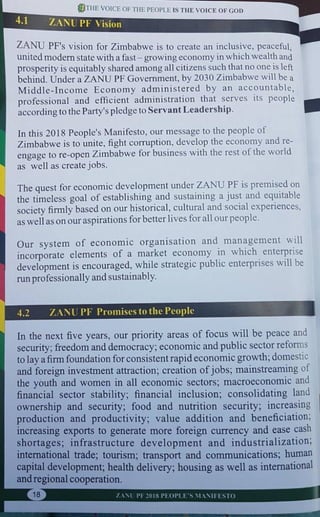
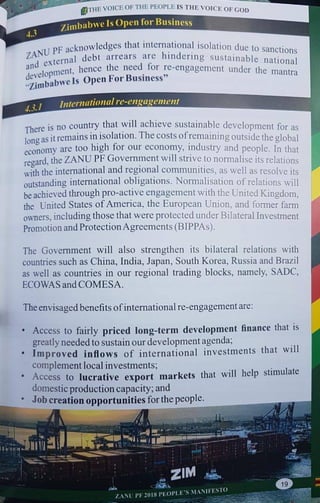
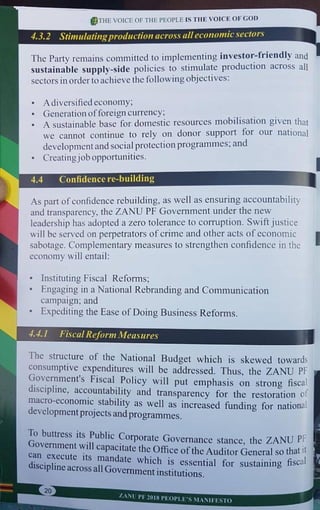
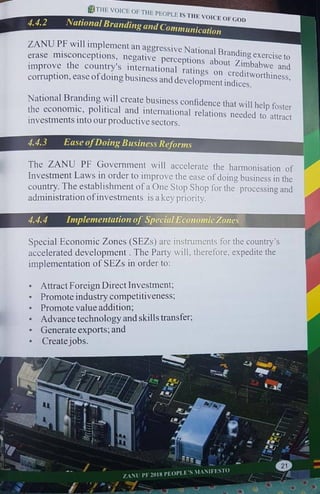
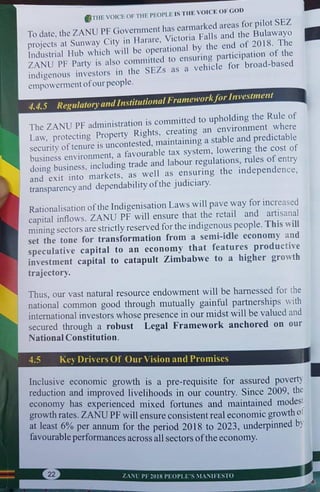
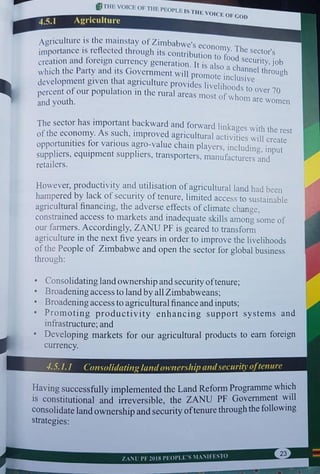
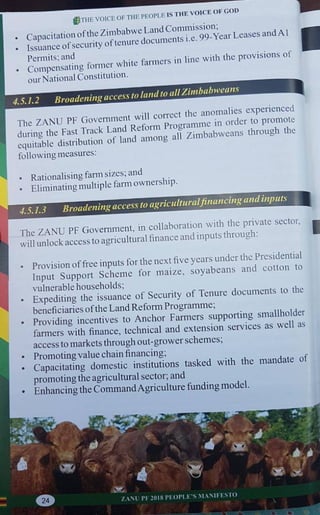
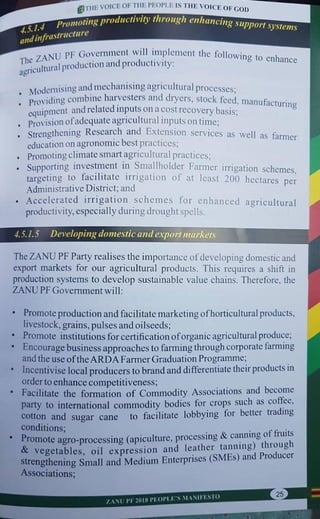
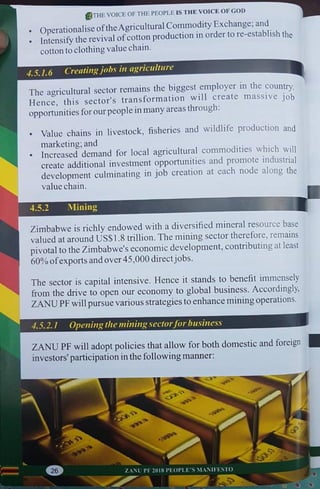
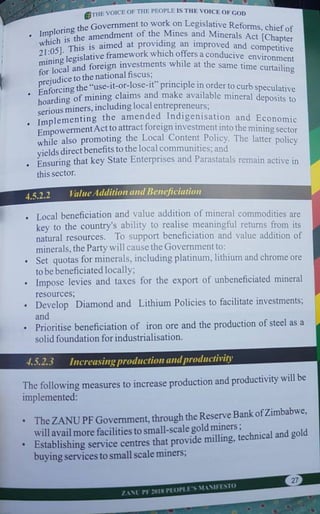
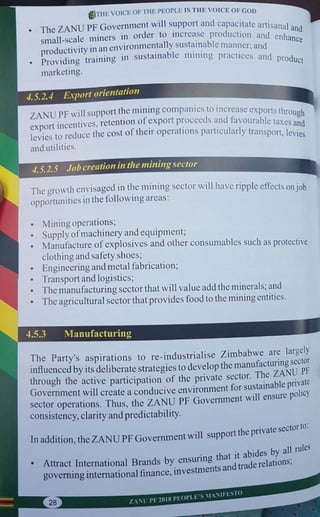
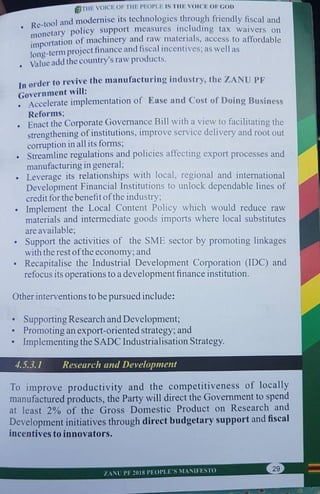
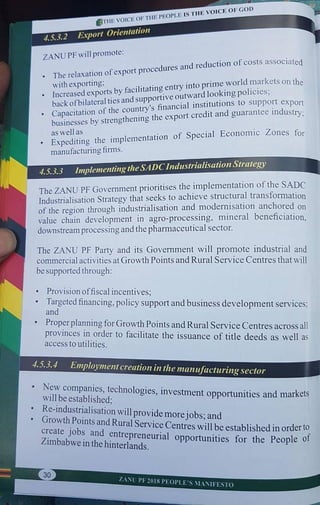
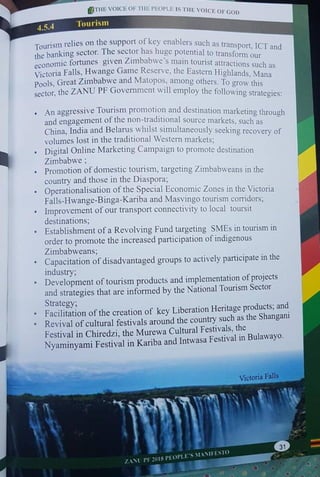
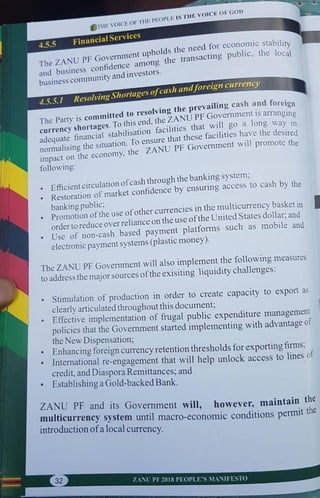
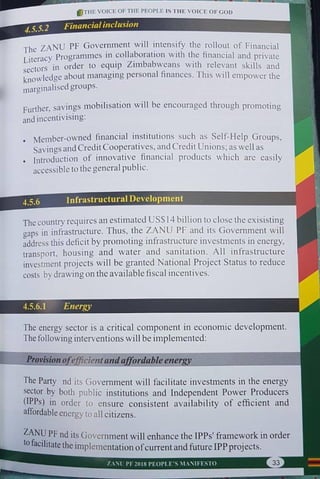
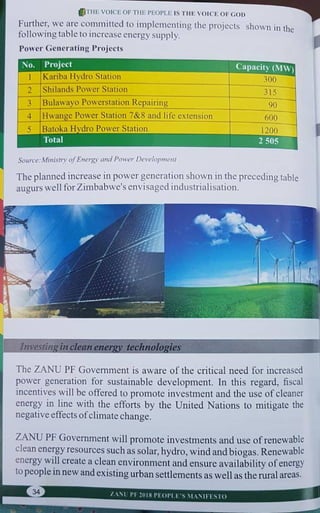
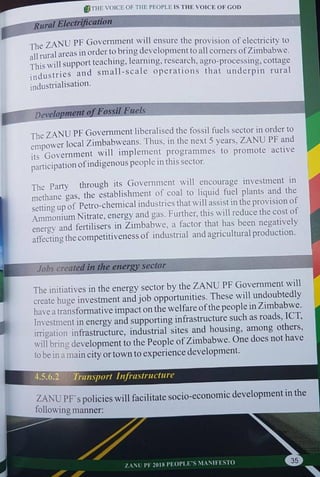
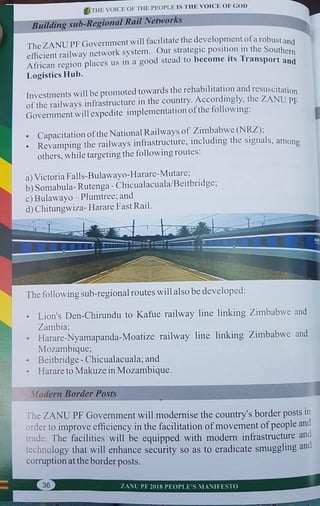
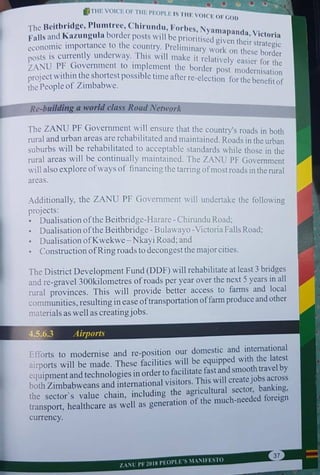
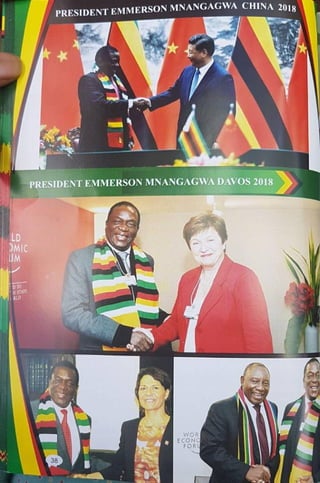
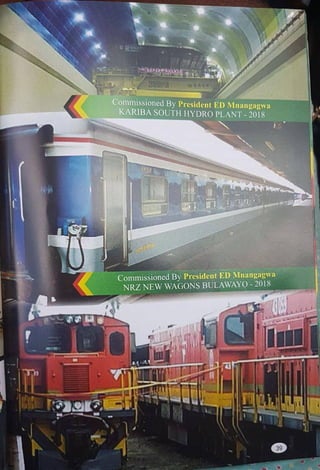
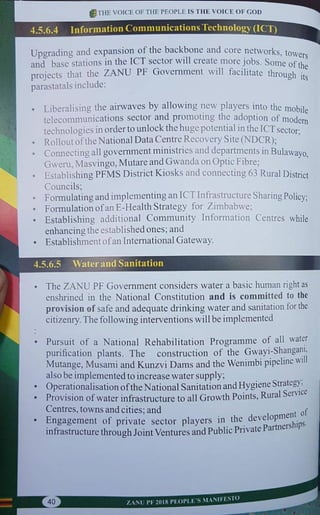
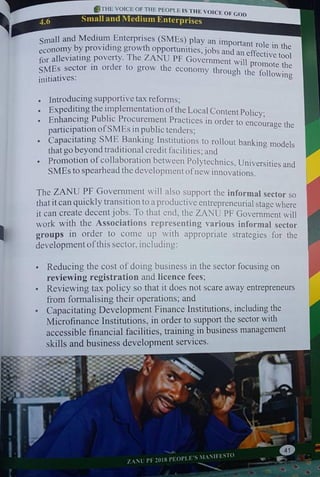
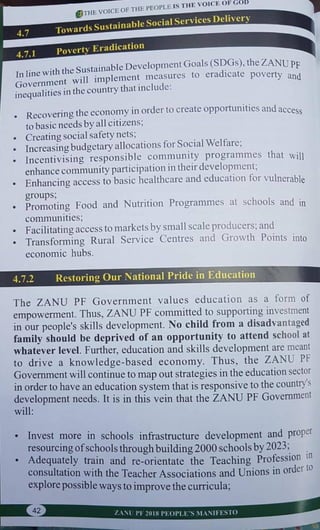
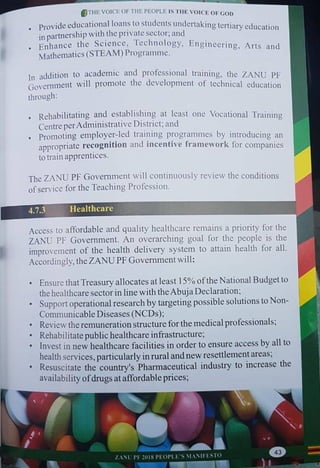
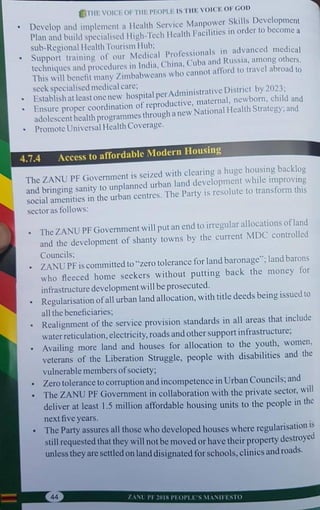
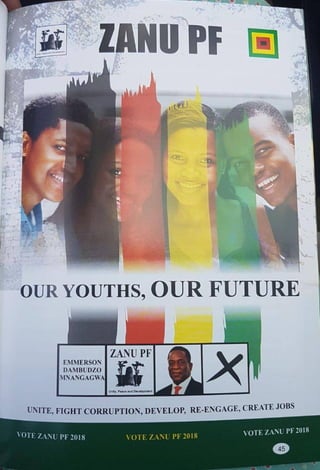
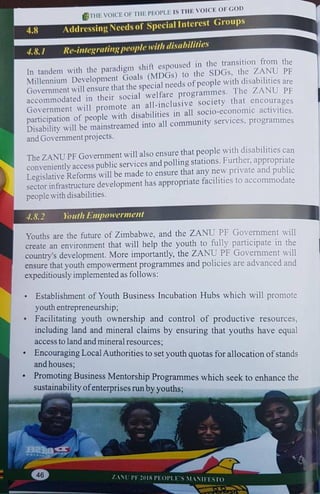
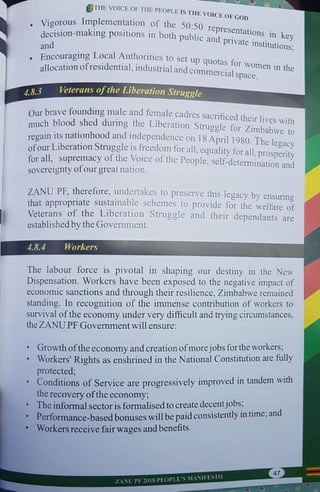
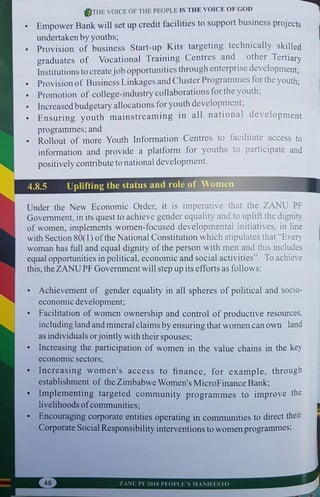
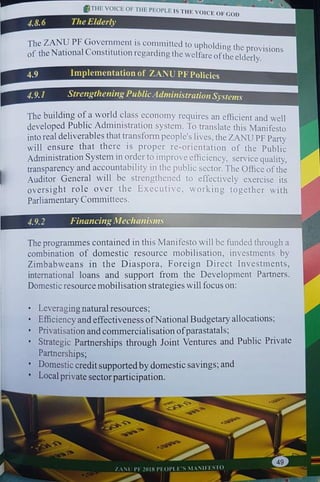
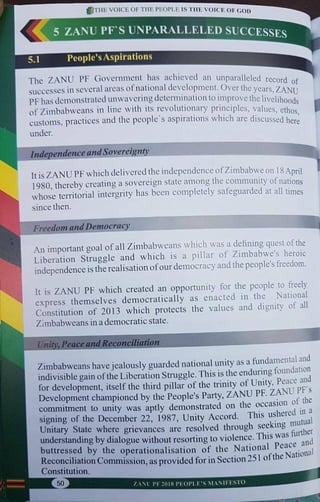
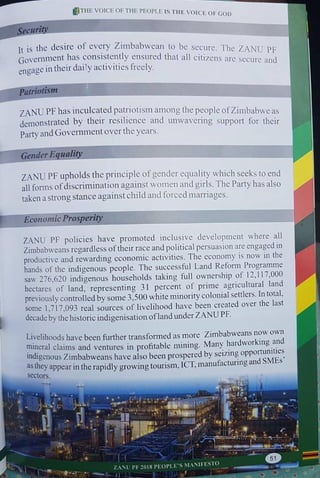
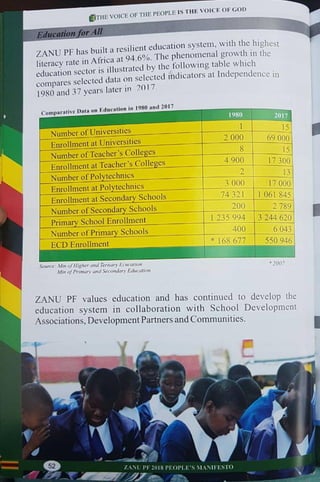
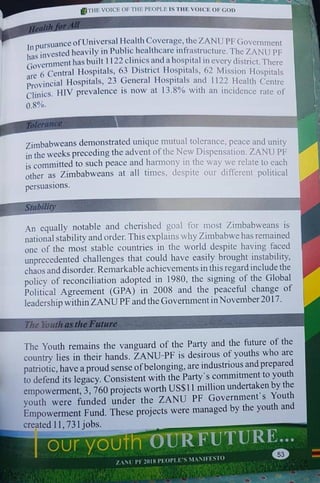
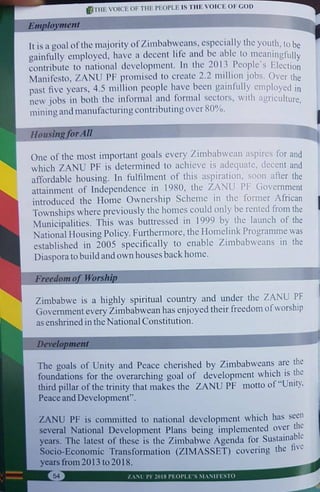
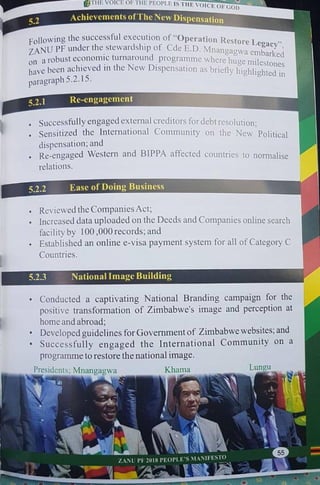
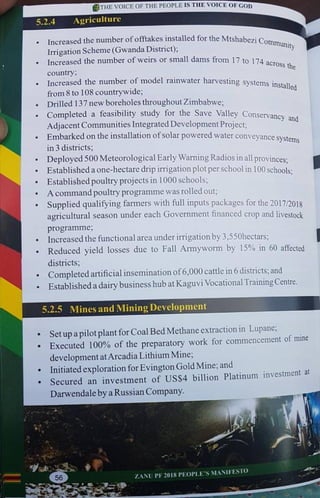
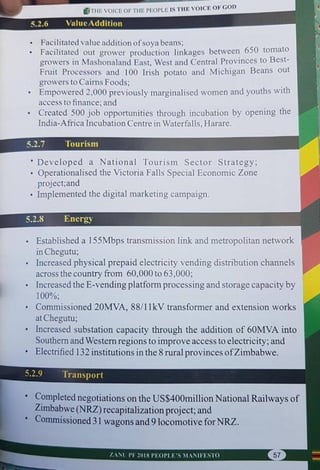
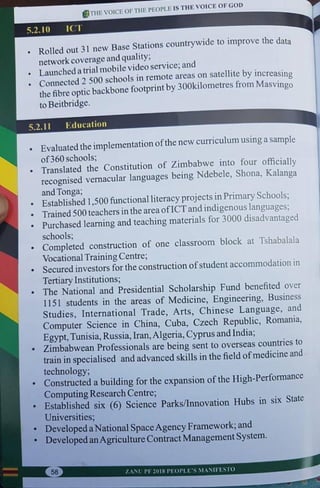
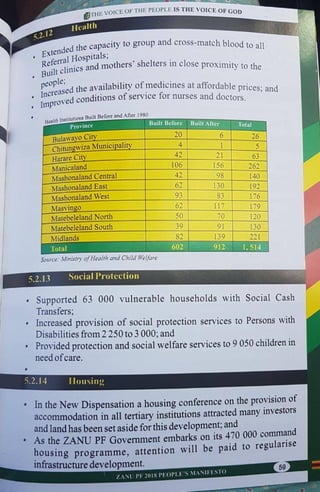
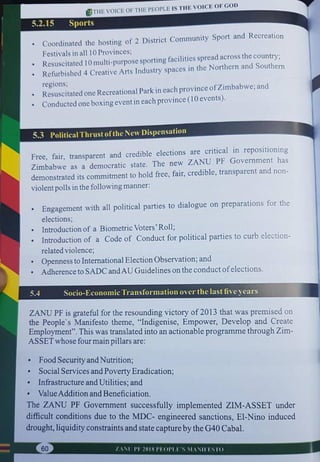
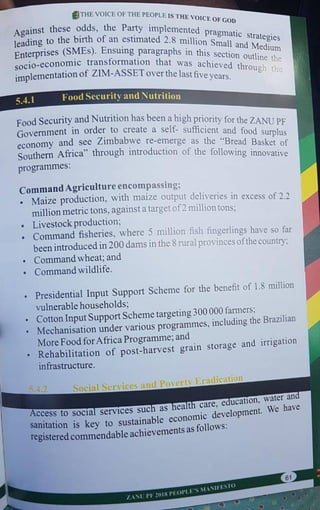
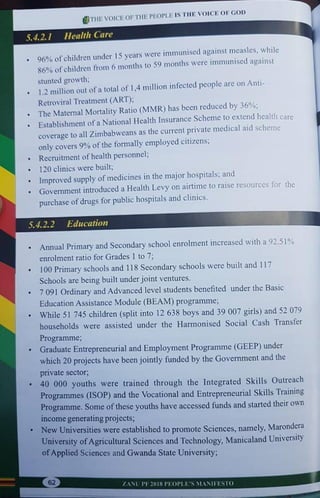
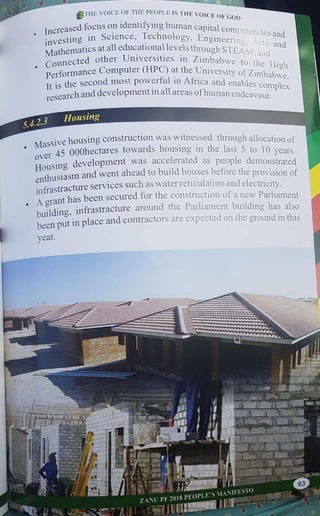
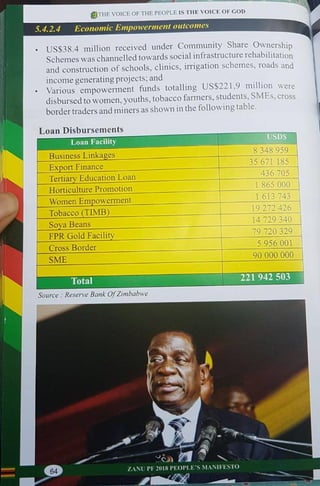
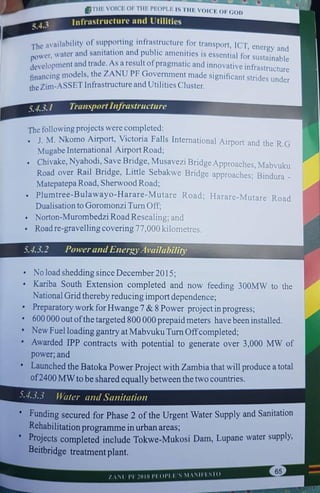
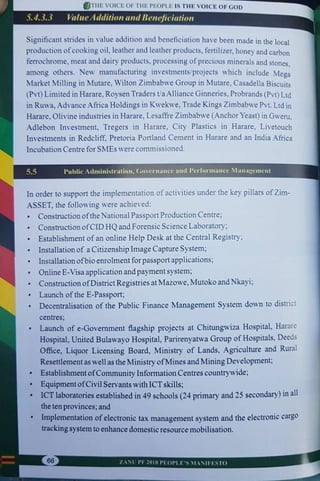

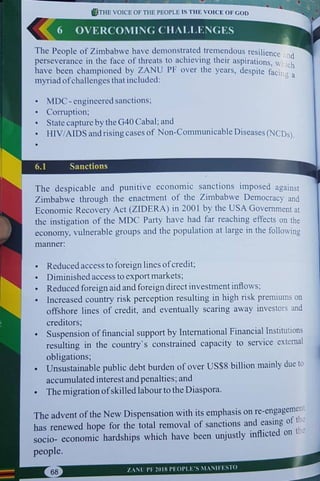
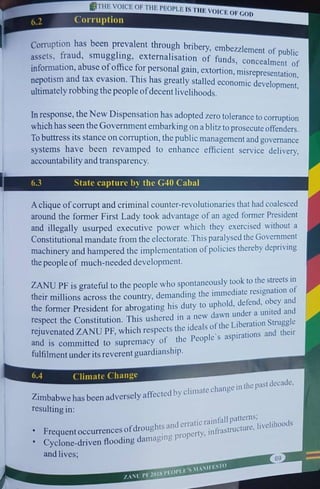
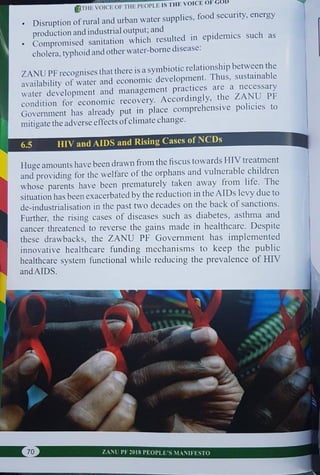

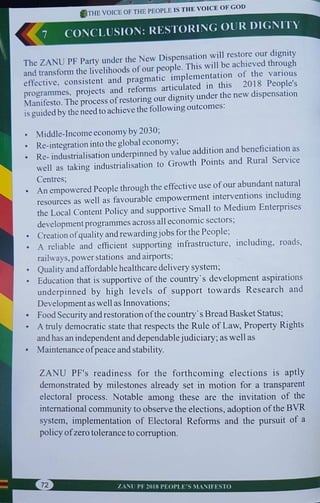
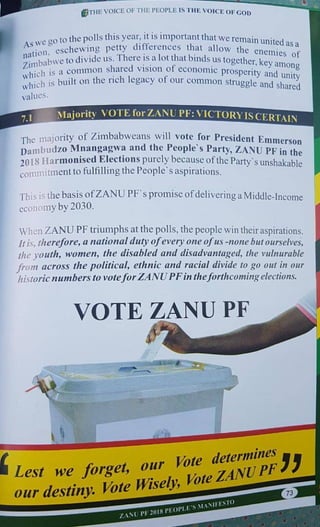

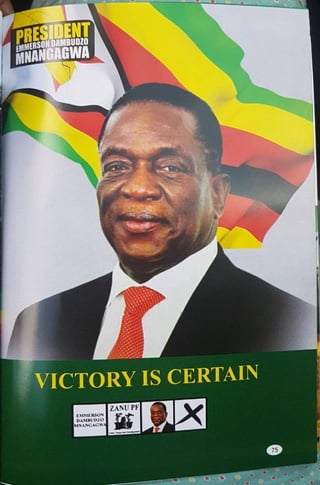

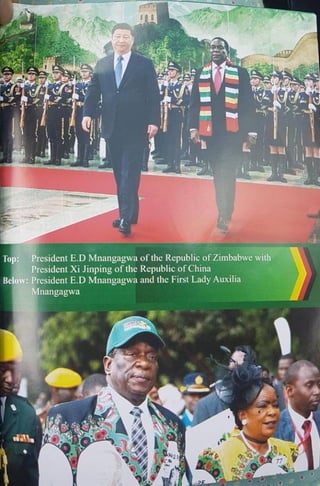
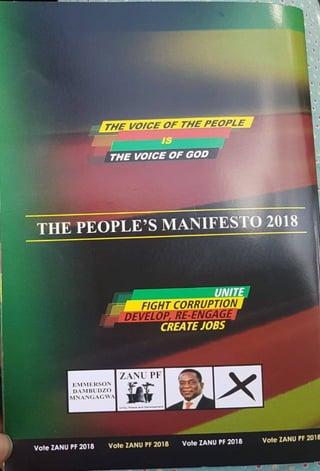
Ad
Recommended
Certificate of exemption in terms of section 46(3) of the regulation of inter...
Certificate of exemption in terms of section 46(3) of the regulation of inter...Povo News
╠²
The government gazette announces the exemption of the South African Police Service from certain prohibited acts related to specified communication interception equipment for a period of five years. The exemption includes strict conditions for the use, authorization, access control, and record-keeping associated with this equipment. Additionally, compliance oversight measures and reporting requirements are established to ensure accountability and adherence to the law.Superseding Indictment against Donald Trump by the US Special Counsel Jack Smith
Superseding Indictment against Donald Trump by the US Special Counsel Jack SmithPovo News
╠²
The document is a filing in case 1:23-cr-00257-tsc, consisting of 36 pages. It was filed on August 27, 2024. Specific details about the contents and purpose of the filing are not provided.The National Artificial Intelligence Strategy of Mauritania (2024- 2029)
The National Artificial Intelligence Strategy of Mauritania (2024- 2029)Povo News
╠²
The National Artificial Intelligence Strategy of Mauritania for 2024-2029 aims to position the country as a key player in AI by focusing on human resource development, research, international collaborations, data governance, and ethical technology use. Key initiatives include AI applications in healthcare, education, agriculture, fishing, transport, energy, and defense, which are expected to drive modernization and sustainable development. The strategy outlines five strategic priorities and includes training programs, research funding, and ethical AI regulations to enhance economic growth and innovation.China's Cybersecurity Technology ŌĆō Basic Security Requirements for Generative...
China's Cybersecurity Technology ŌĆō Basic Security Requirements for Generative...Povo News
╠²
The Chinese standard for generative AI establishes oversight processes for AI companies regarding model training data and generated content, identifying over 30 safety risks including issues like algorithmic bias and copyright infringement. It emphasizes the need for safety assessments of AI models' underlying hardware and software, along with specific compliance requirements related to corpus sourcing, content safety, and intellectual property rights. Released by the National Technical Committee on Cybersecurity, these guidelines aim to ensure the safe deployment of generative AI services in China.Egypt's National Artificial Intelligence Strategy
Egypt's National Artificial Intelligence StrategyPovo News
╠²
Egypt is developing a national AI strategy to enhance its economy and improve citizens' quality of life by embracing emerging technologies. The strategy focuses on four main pillars: AI for government, AI for development, capacity building, and international cooperation, with a phased implementation plan starting in 2020. It aims to establish Egypt as a regional AI hub and ensure ethical practices in AI usage while addressing challenges and opportunities presented by technological advancements.Ghana's National Artificial Intelligence Strategy 2023 - 2033.pdf
Ghana's National Artificial Intelligence Strategy 2023 - 2033.pdfPovo News
╠²
The Republic of Ghana's National Artificial Intelligence Strategy (2023-2033) aims to leverage AI for inclusive growth across sectors, enhancing the lives of Ghanaians and establishing the country as a leader in AI within Africa. Developed by the Ministry of Communications and Digitalisation with input from various stakeholders, the strategy outlines a roadmap focusing on eight key pillars, including expanding AI education, improving infrastructure, and promoting responsible AI practices. The initiative emphasizes the importance of data governance, ethical considerations, and the establishment of a responsible AI office to oversee implementation and ensure sustainable development.South African Artificial Intelligence plan
South African Artificial Intelligence planPovo News
╠²
The document outlines South Africa's strategic plan for adopting artificial intelligence (AI), emphasizing the technology's potential benefits and risks. It highlights key initiatives, such as the establishment of the AI Institute of South Africa and the Centre for Artificial Intelligence Research, and proposes a governance framework to guide AI development. The plan aims to align stakeholders on national priorities and leverage AI for social and economic prosperity while managing its negative impacts.Mauritius Artificial IntelligenceI Strategy November 2018
Mauritius Artificial IntelligenceI Strategy November 2018Povo News
╠²
The Mauritius Artificial Intelligence Strategy outlines the government's commitment to leveraging AI to enhance economic growth, productivity, and quality of life, emphasizing the establishment of an AI council to oversee its implementation. The strategy identifies potential applications of AI across various sectors, including manufacturing, healthcare, fintech, agriculture, and energy management, while recommending a collaborative ecosystem and capacity-building initiatives. The report highlights the necessity for a robust regulatory framework and fiscal incentives to promote AI adoption and sustain long-term economic development.Rwanda's National Artificial Intelligence Policy
Rwanda's National Artificial Intelligence PolicyPovo News
╠²
The National AI Policy of Rwanda aims to leverage artificial intelligence to drive economic growth, enhance quality of life, and establish Rwanda as a leading center for responsible and inclusive AI innovation. It outlines key policy areas focusing on AI literacy, infrastructure, data strategy, and public and private sector adoption, while ensuring ethical standards and addressing potential risks associated with AI technologies. The policy serves as a roadmap for stakeholders, emphasizing collaboration to harness AI's benefits and mitigate its challenges as part of Rwanda's Vision 2050 objectives.Nigeria's Draft National Artificial Intelligence Strategy
Nigeria's Draft National Artificial Intelligence StrategyPovo News
╠²
The draft National Artificial Intelligence Strategy 2024 acknowledges contributions from various stakeholders to harness AI for Nigeria's socio-economic development. It outlines Nigeria's vision to lead in ethical AI innovation, addressing challenges while leveraging opportunities to drive sustainable growth. The strategy emphasizes the importance of a holistic, inclusive approach that engages diverse sectors to ensure the benefits of AI reach all citizens.Kenya's Draft Artificial Intelligence Code of Practice for AI Applications
Kenya's Draft Artificial Intelligence Code of Practice for AI ApplicationsPovo News
╠²
The draft Kenya Standard DKS 3007:2024 outlines a code of practice for artificial intelligence (AI) applications, focusing on responsible development and use across various sectors. It emphasizes the importance of trustworthiness, transparency, and ethics in AI systems, providing guidance on risk management and stakeholder responsibilities. The document is a collaborative effort among multiple organizations and aims to address potential societal challenges and ethical concerns associated with AI technology.Benin's National Artificial Intelligence & Big Data Strategy 2023 - 2027
Benin's National Artificial Intelligence & Big Data Strategy 2023 - 2027Povo News
╠²
Benin's National Artificial Intelligence and Big Data Strategy (SNIAM) was developed by the Ministry of Digital Affairs, aiming to leverage AI and big data for sectors such as education, healthcare, and agriculture by 2027. Adopted on January 18, 2023, the strategy includes four programs and a comprehensive plan of 123 actions over five years, positioning Benin as a competitive hub for AI and investment in West Africa. The strategy focuses on establishing a supportive ecosystem, enhancing human capital, and integrating AI into national development policies to improve growth and living conditions.CCC Zimbabwe 2023 election manifesto - A new Great Zimbabwe blueprint for Eve...
CCC Zimbabwe 2023 election manifesto - A new Great Zimbabwe blueprint for Eve...Povo News
╠²
The document outlines a plan to transform Zimbabwe called "A New Great Zimbabwe Blueprint". The key points of the plan are:
1. Restoration - Recalibrating and reviving the country through restoring faith, dignity, rule of law, and relations.
2. Reconstruction - Rebuilding infrastructure, industry, and refurbishing dilapidated areas.
3. Modernization and wealth creation - Modernizing institutions, sectors, and systems to create wealth.
4. Transformation - Transforming culture, structure, infrastructure, strategies and institutions in 5 critical areas.
5. Reconciliation - Building a united nation through restorative justice, truth, forgiveness and reconciliation.
The plan aimsNSSA Zimbabwe Forensic Audit Report
NSSA Zimbabwe Forensic Audit ReportPovo News
╠²
National Social Security Authority of Zimbabwe (NSSA) Forensic Audit Report (1 January 2015 to 28 February 2018)South Africa's 2019 Budget speech
South Africa's 2019 Budget speechPovo News
╠²
The 2019 South African budget speech by Minister Tito Mboweni outlines the nation's financial situation and strategies for economic renewal. Key objectives include achieving higher economic growth, increasing tax collection, and managing state-owned enterprises while addressing the public sector wage bill. The budget also emphasizes redistributive policies, with significant allocations for education, health, and social development, aiming to foster inclusive growth and improve the living conditions for all South Africans.Zimbabwe's 2019 Monetary Policy Statement
Zimbabwe's 2019 Monetary Policy Statement Povo News
╠²
The Reserve Bank of Zimbabwe has established an inter-bank foreign exchange market to formalize the trading of local currencies with international currencies, aiming to restore economic competitiveness and address inflationary pressures. This new framework is designed to stabilize the pricing of goods and services, eliminate multi-tier pricing, and enhance the liquidity and efficiency of the foreign exchange market. The policy measures outlined also include a focus on anti-money laundering, cyber risk management, and the implementation of international financial reporting standards to improve financial stability.Botswana's 2019 budget speech
Botswana's 2019 budget speechPovo News
╠²
The document is the 2019 budget speech for Botswana delivered by the Minister of Finance and Economic Development. It outlines the country's economic achievements in recent decades, including transitioning to an upper-middle income economy. It emphasizes the need to consolidate development gains to further economic transformation. Key priorities for 2019/2020 include maintaining macroeconomic stability, continuing economic diversification efforts through various initiatives like special economic zones and cluster development, and promoting private sector development to drive growth and employment. Infrastructure development and initiatives to achieve social development goals like poverty eradication are also highlighted.EFF 2019 election manifesto
EFF 2019 election manifestoPovo News
╠²
The Economic Freedom Fighters (EFF) manifesto for the 2019 general elections emphasizes land expropriation and job creation as essential for achieving true economic emancipation in South Africa. The document outlines the urgent need to address systemic economic disparities, arguing that political freedom has not translated into economic power for the black majority. Through a comprehensive plan rooted in public input and political experience, the EFF seeks to implement policies that aim to redistribute land, nationalize key sectors, and ensure equitable access to resources and economic opportunities.Comesa Investment Trend 2018 report
Comesa Investment Trend 2018 reportPovo News
╠²
This document provides an overview of foreign direct investment (FDI) trends in the Common Market for Eastern and Southern Africa (COMESA) region from 2008 to 2017. It finds that while global FDI flows declined in 2017, FDI inflows to the COMESA region increased slightly. Egypt and Ethiopia attracted over 60% of total FDI to COMESA in 2017. Several countries saw significant increases or decreases in FDI inflows. The top sectors for FDI varied by country but included petroleum, manufacturing, real estate, and financial services. National policies on investment were also discussed.Priscilla Chigumba's affidavit in opposition to #ChamisaPetiton
Priscilla Chigumba's affidavit in opposition to #ChamisaPetiton Povo News
╠²
This document is a legal affidavit from Priscilla Makanyara Chigumba, the chairperson of the Zimbabwe Electoral Commission, opposing the application filed by Nelson Chamisa challenging the election of Emerson Mnangagwa. Chigumba argues that Chamisa's application is invalid due to improper filing and service beyond the statutory seven-day period set forth in the Constitution of Zimbabwe. Furthermore, she emphasizes that the alleged evidence supporting Chamisa's claims is missing and that the 2018 elections were conducted fairly and transparently.Nelson Chamisa's answering affidavit & heads of argument
Nelson Chamisa's answering affidavit & heads of argument Povo News
╠²
The document outlines a constitutional court case in Zimbabwe regarding the validity of the 2018 presidential elections, focusing on allegations of electoral irregularities, including coercion, intimidation, and miscalculations in vote counting that favored the incumbent president, Emmerson Mnangagwa. The applicant, Nelson Chamisa, argues that the elections were neither free nor fair and requests their invalidation based on constitutional rights and legal principles. The court's determination will hinge upon the legal framework for challenging the election results and whether the evidence supports the claims of irregularities affecting the outcome.Mnangagwa's opposing papers to the #ChamisaPetition
Mnangagwa's opposing papers to the #ChamisaPetition Povo News
╠²
The provided document outlines key features and benefits of a new product. It highlights its innovative technology, user-friendly design, and market potential. Additionally, the document discusses targeted demographics and marketing strategies.Chamisa's court challenge on Zim's 2018 presidential election results
Chamisa's court challenge on Zim's 2018 presidential election resultsPovo News
╠²
The document discusses the history and development of artificial intelligence over several decades. Early research focused on symbolic approaches using rules and logic but progress was slow. More recently, machine learning techniques such as deep learning have seen increasing success by learning from large amounts of data without being explicitly programmed. These new approaches are being applied to many areas and fueling a new wave of innovation and technology development.Chamisa's court challenge on Zim's 2018 presidential election results (Draft)
Chamisa's court challenge on Zim's 2018 presidential election results (Draft)Povo News
╠²
The document is a founding affidavit by Nelson Chamisa challenging the results of the Zimbabwe presidential election held on July 30, 2018, claiming they were irregularly announced by the Zimbabwe Electoral Commission (ZEC) and that Emmerson Mnangagwa was wrongfully declared the winner. Chamisa cites various constitutional and electoral violations, including the lack of independence of the ZEC, biased state media coverage, and improper voter registration practices that undermined the election's fairness. The affidavit includes affidavits from his election agents and evidence to support these claims, forming the basis of the legal challenge against the election results.Technical analysis of Zimbabwes biometric voters roll by Pachedu
Technical analysis of Zimbabwes biometric voters roll by PacheduPovo News
╠²
This document analyzes Zimbabwe's 2018 voter roll for inconsistencies and anomalies that could indicate manipulation. It finds that the demographic distribution in the voter roll is inconsistent with Zimbabwe's demographic models and census data, suggesting possible manipulation. It also finds numerous instances of duplicated or altered identification numbers when compared to previous voter rolls from 2008 and 2013, as well as other internal inconsistencies, implicating deliberate efforts to alter records. The major conclusion is that "ghost voters" who do not have a genuine record of registration do seem to exist in the 2018 voter roll despite biometric registration systems, making the integrity of the results questionable.Zimbabwe 2018 biometric voters roll analysis - Pachedu
Zimbabwe 2018 biometric voters roll analysis - PacheduPovo News
╠²
The document analyzes Zimbabwe's 2018 voter roll and identifies over 250,000 records with inaccuracies or duplication, such as invalid ID numbers, duplicate ID numbers, same names/dates of birth, address anomalies, and records assigned to incorrect districts. It finds statistically improbable surname/ID number combinations for over 122,000 records and over 100,000 records appear to have been copied from the 2013 voter roll. The analysis raises concerns about the integrity of the voter roll and Zimbabwe's upcoming election.Trust Luckmore Mugari Harare Ward 42 Election Manifesto (Short Version)
Trust Luckmore Mugari Harare Ward 42 Election Manifesto (Short Version)Povo News
╠²
The document appears to promote an independent candidate, Mugari, for a local leadership position, emphasizing trust and community service. It highlights the candidate's vision for better community and service delivery. Contact information and associations with specific neighborhoods are also mentioned.Trust Luckmore Mugari - Harare Ward 42 Election Manifesto
Trust Luckmore Mugari - Harare Ward 42 Election ManifestoPovo News
╠²
The document outlines a manifesto by Luckmore Mugari, an independent candidate for councilor, aiming to improve community conditions in Ward 45. Key issues addressed include poor service delivery, lack of education, youth neglect, and community engagement, alongside plans for better resource management, increased access to clean water, and youth empowerment. The document emphasizes the importance of unity and leadership in addressing these challenges and fostering a supportive environment for community development.Pathos Communications When Reputation Management Becomes Reputation Destructi...
Pathos Communications When Reputation Management Becomes Reputation Destructi...nathaniel leonard
╠²
A recent letter from UK-based firm Pathos Communications: When Reputation Management Becomes Reputation DestructionConnecting the Indian Community Abroad ŌĆō New India Abroad
Connecting the Indian Community Abroad ŌĆō New India AbroadNew India Abroad
╠²
New India Abroad is dedicated to strengthening the global Indian community by sharing inspiring stories, news, and achievements of Indians living overseas. We highlight their contributions across business, culture, science, and public service. Whether it's entrepreneurship in the U.S. or academic success in Europe, New India Abroad brings their journeys to light. Our mission is to foster unity, pride, and a shared identity among the vibrant Indian community abroad, helping them stay informed and connected.More Related Content
More from Povo News (20)
Rwanda's National Artificial Intelligence Policy
Rwanda's National Artificial Intelligence PolicyPovo News
╠²
The National AI Policy of Rwanda aims to leverage artificial intelligence to drive economic growth, enhance quality of life, and establish Rwanda as a leading center for responsible and inclusive AI innovation. It outlines key policy areas focusing on AI literacy, infrastructure, data strategy, and public and private sector adoption, while ensuring ethical standards and addressing potential risks associated with AI technologies. The policy serves as a roadmap for stakeholders, emphasizing collaboration to harness AI's benefits and mitigate its challenges as part of Rwanda's Vision 2050 objectives.Nigeria's Draft National Artificial Intelligence Strategy
Nigeria's Draft National Artificial Intelligence StrategyPovo News
╠²
The draft National Artificial Intelligence Strategy 2024 acknowledges contributions from various stakeholders to harness AI for Nigeria's socio-economic development. It outlines Nigeria's vision to lead in ethical AI innovation, addressing challenges while leveraging opportunities to drive sustainable growth. The strategy emphasizes the importance of a holistic, inclusive approach that engages diverse sectors to ensure the benefits of AI reach all citizens.Kenya's Draft Artificial Intelligence Code of Practice for AI Applications
Kenya's Draft Artificial Intelligence Code of Practice for AI ApplicationsPovo News
╠²
The draft Kenya Standard DKS 3007:2024 outlines a code of practice for artificial intelligence (AI) applications, focusing on responsible development and use across various sectors. It emphasizes the importance of trustworthiness, transparency, and ethics in AI systems, providing guidance on risk management and stakeholder responsibilities. The document is a collaborative effort among multiple organizations and aims to address potential societal challenges and ethical concerns associated with AI technology.Benin's National Artificial Intelligence & Big Data Strategy 2023 - 2027
Benin's National Artificial Intelligence & Big Data Strategy 2023 - 2027Povo News
╠²
Benin's National Artificial Intelligence and Big Data Strategy (SNIAM) was developed by the Ministry of Digital Affairs, aiming to leverage AI and big data for sectors such as education, healthcare, and agriculture by 2027. Adopted on January 18, 2023, the strategy includes four programs and a comprehensive plan of 123 actions over five years, positioning Benin as a competitive hub for AI and investment in West Africa. The strategy focuses on establishing a supportive ecosystem, enhancing human capital, and integrating AI into national development policies to improve growth and living conditions.CCC Zimbabwe 2023 election manifesto - A new Great Zimbabwe blueprint for Eve...
CCC Zimbabwe 2023 election manifesto - A new Great Zimbabwe blueprint for Eve...Povo News
╠²
The document outlines a plan to transform Zimbabwe called "A New Great Zimbabwe Blueprint". The key points of the plan are:
1. Restoration - Recalibrating and reviving the country through restoring faith, dignity, rule of law, and relations.
2. Reconstruction - Rebuilding infrastructure, industry, and refurbishing dilapidated areas.
3. Modernization and wealth creation - Modernizing institutions, sectors, and systems to create wealth.
4. Transformation - Transforming culture, structure, infrastructure, strategies and institutions in 5 critical areas.
5. Reconciliation - Building a united nation through restorative justice, truth, forgiveness and reconciliation.
The plan aimsNSSA Zimbabwe Forensic Audit Report
NSSA Zimbabwe Forensic Audit ReportPovo News
╠²
National Social Security Authority of Zimbabwe (NSSA) Forensic Audit Report (1 January 2015 to 28 February 2018)South Africa's 2019 Budget speech
South Africa's 2019 Budget speechPovo News
╠²
The 2019 South African budget speech by Minister Tito Mboweni outlines the nation's financial situation and strategies for economic renewal. Key objectives include achieving higher economic growth, increasing tax collection, and managing state-owned enterprises while addressing the public sector wage bill. The budget also emphasizes redistributive policies, with significant allocations for education, health, and social development, aiming to foster inclusive growth and improve the living conditions for all South Africans.Zimbabwe's 2019 Monetary Policy Statement
Zimbabwe's 2019 Monetary Policy Statement Povo News
╠²
The Reserve Bank of Zimbabwe has established an inter-bank foreign exchange market to formalize the trading of local currencies with international currencies, aiming to restore economic competitiveness and address inflationary pressures. This new framework is designed to stabilize the pricing of goods and services, eliminate multi-tier pricing, and enhance the liquidity and efficiency of the foreign exchange market. The policy measures outlined also include a focus on anti-money laundering, cyber risk management, and the implementation of international financial reporting standards to improve financial stability.Botswana's 2019 budget speech
Botswana's 2019 budget speechPovo News
╠²
The document is the 2019 budget speech for Botswana delivered by the Minister of Finance and Economic Development. It outlines the country's economic achievements in recent decades, including transitioning to an upper-middle income economy. It emphasizes the need to consolidate development gains to further economic transformation. Key priorities for 2019/2020 include maintaining macroeconomic stability, continuing economic diversification efforts through various initiatives like special economic zones and cluster development, and promoting private sector development to drive growth and employment. Infrastructure development and initiatives to achieve social development goals like poverty eradication are also highlighted.EFF 2019 election manifesto
EFF 2019 election manifestoPovo News
╠²
The Economic Freedom Fighters (EFF) manifesto for the 2019 general elections emphasizes land expropriation and job creation as essential for achieving true economic emancipation in South Africa. The document outlines the urgent need to address systemic economic disparities, arguing that political freedom has not translated into economic power for the black majority. Through a comprehensive plan rooted in public input and political experience, the EFF seeks to implement policies that aim to redistribute land, nationalize key sectors, and ensure equitable access to resources and economic opportunities.Comesa Investment Trend 2018 report
Comesa Investment Trend 2018 reportPovo News
╠²
This document provides an overview of foreign direct investment (FDI) trends in the Common Market for Eastern and Southern Africa (COMESA) region from 2008 to 2017. It finds that while global FDI flows declined in 2017, FDI inflows to the COMESA region increased slightly. Egypt and Ethiopia attracted over 60% of total FDI to COMESA in 2017. Several countries saw significant increases or decreases in FDI inflows. The top sectors for FDI varied by country but included petroleum, manufacturing, real estate, and financial services. National policies on investment were also discussed.Priscilla Chigumba's affidavit in opposition to #ChamisaPetiton
Priscilla Chigumba's affidavit in opposition to #ChamisaPetiton Povo News
╠²
This document is a legal affidavit from Priscilla Makanyara Chigumba, the chairperson of the Zimbabwe Electoral Commission, opposing the application filed by Nelson Chamisa challenging the election of Emerson Mnangagwa. Chigumba argues that Chamisa's application is invalid due to improper filing and service beyond the statutory seven-day period set forth in the Constitution of Zimbabwe. Furthermore, she emphasizes that the alleged evidence supporting Chamisa's claims is missing and that the 2018 elections were conducted fairly and transparently.Nelson Chamisa's answering affidavit & heads of argument
Nelson Chamisa's answering affidavit & heads of argument Povo News
╠²
The document outlines a constitutional court case in Zimbabwe regarding the validity of the 2018 presidential elections, focusing on allegations of electoral irregularities, including coercion, intimidation, and miscalculations in vote counting that favored the incumbent president, Emmerson Mnangagwa. The applicant, Nelson Chamisa, argues that the elections were neither free nor fair and requests their invalidation based on constitutional rights and legal principles. The court's determination will hinge upon the legal framework for challenging the election results and whether the evidence supports the claims of irregularities affecting the outcome.Mnangagwa's opposing papers to the #ChamisaPetition
Mnangagwa's opposing papers to the #ChamisaPetition Povo News
╠²
The provided document outlines key features and benefits of a new product. It highlights its innovative technology, user-friendly design, and market potential. Additionally, the document discusses targeted demographics and marketing strategies.Chamisa's court challenge on Zim's 2018 presidential election results
Chamisa's court challenge on Zim's 2018 presidential election resultsPovo News
╠²
The document discusses the history and development of artificial intelligence over several decades. Early research focused on symbolic approaches using rules and logic but progress was slow. More recently, machine learning techniques such as deep learning have seen increasing success by learning from large amounts of data without being explicitly programmed. These new approaches are being applied to many areas and fueling a new wave of innovation and technology development.Chamisa's court challenge on Zim's 2018 presidential election results (Draft)
Chamisa's court challenge on Zim's 2018 presidential election results (Draft)Povo News
╠²
The document is a founding affidavit by Nelson Chamisa challenging the results of the Zimbabwe presidential election held on July 30, 2018, claiming they were irregularly announced by the Zimbabwe Electoral Commission (ZEC) and that Emmerson Mnangagwa was wrongfully declared the winner. Chamisa cites various constitutional and electoral violations, including the lack of independence of the ZEC, biased state media coverage, and improper voter registration practices that undermined the election's fairness. The affidavit includes affidavits from his election agents and evidence to support these claims, forming the basis of the legal challenge against the election results.Technical analysis of Zimbabwes biometric voters roll by Pachedu
Technical analysis of Zimbabwes biometric voters roll by PacheduPovo News
╠²
This document analyzes Zimbabwe's 2018 voter roll for inconsistencies and anomalies that could indicate manipulation. It finds that the demographic distribution in the voter roll is inconsistent with Zimbabwe's demographic models and census data, suggesting possible manipulation. It also finds numerous instances of duplicated or altered identification numbers when compared to previous voter rolls from 2008 and 2013, as well as other internal inconsistencies, implicating deliberate efforts to alter records. The major conclusion is that "ghost voters" who do not have a genuine record of registration do seem to exist in the 2018 voter roll despite biometric registration systems, making the integrity of the results questionable.Zimbabwe 2018 biometric voters roll analysis - Pachedu
Zimbabwe 2018 biometric voters roll analysis - PacheduPovo News
╠²
The document analyzes Zimbabwe's 2018 voter roll and identifies over 250,000 records with inaccuracies or duplication, such as invalid ID numbers, duplicate ID numbers, same names/dates of birth, address anomalies, and records assigned to incorrect districts. It finds statistically improbable surname/ID number combinations for over 122,000 records and over 100,000 records appear to have been copied from the 2013 voter roll. The analysis raises concerns about the integrity of the voter roll and Zimbabwe's upcoming election.Trust Luckmore Mugari Harare Ward 42 Election Manifesto (Short Version)
Trust Luckmore Mugari Harare Ward 42 Election Manifesto (Short Version)Povo News
╠²
The document appears to promote an independent candidate, Mugari, for a local leadership position, emphasizing trust and community service. It highlights the candidate's vision for better community and service delivery. Contact information and associations with specific neighborhoods are also mentioned.Trust Luckmore Mugari - Harare Ward 42 Election Manifesto
Trust Luckmore Mugari - Harare Ward 42 Election ManifestoPovo News
╠²
The document outlines a manifesto by Luckmore Mugari, an independent candidate for councilor, aiming to improve community conditions in Ward 45. Key issues addressed include poor service delivery, lack of education, youth neglect, and community engagement, alongside plans for better resource management, increased access to clean water, and youth empowerment. The document emphasizes the importance of unity and leadership in addressing these challenges and fostering a supportive environment for community development.Recently uploaded (12)
Pathos Communications When Reputation Management Becomes Reputation Destructi...
Pathos Communications When Reputation Management Becomes Reputation Destructi...nathaniel leonard
╠²
A recent letter from UK-based firm Pathos Communications: When Reputation Management Becomes Reputation DestructionConnecting the Indian Community Abroad ŌĆō New India Abroad
Connecting the Indian Community Abroad ŌĆō New India AbroadNew India Abroad
╠²
New India Abroad is dedicated to strengthening the global Indian community by sharing inspiring stories, news, and achievements of Indians living overseas. We highlight their contributions across business, culture, science, and public service. Whether it's entrepreneurship in the U.S. or academic success in Europe, New India Abroad brings their journeys to light. Our mission is to foster unity, pride, and a shared identity among the vibrant Indian community abroad, helping them stay informed and connected.EDSA Revolution and Democracy - the Youth and Students in Focus [uploadable]....
EDSA Revolution and Democracy - the Youth and Students in Focus [uploadable]....ssuser0e98111
╠²
This presentation talks about the EDSA Revolution and Democracy in general and its context with the youth.Air India Plane Crash: Tragedy Strikes Near Ahmedabad
Air India Plane Crash: Tragedy Strikes Near AhmedabadNew India Abroad
╠²
The Air India Plane Crash on June 12, 2025, shocked the nation and the global Indian community. A Boeing 787-8 Dreamliner, carrying 242 passengers and crew, crashed shortly after taking off from Ahmedabad Airport, on route to London. The aircraft struck a hostel near B.J. Medical College, causing fatalities both onboard and on the ground. Investigations are ongoing, focusing on possible engine failure. One Indian-origin British passenger survived. Families worldwide are mourning this tragic Air India Plane Crash, and New India Abroad continues to provide in-depth coverage on the disaster and its far-reaching impact.Oneworld Energy USA LLC Fraud CEO Mike Minor.pptx
Oneworld Energy USA LLC Fraud CEO Mike Minor.pptxnathaniel leonard
╠²
Oneworld Energy USA LLC CEO Accused in Multi-Jurisdictional Fraud: A Closer Look at Mike MinorGatwick AG About A Company Shut Down by UK Courts Still Sells Offshore Servic...
Gatwick AG About A Company Shut Down by UK Courts Still Sells Offshore Servic...nathaniel leonard
╠²
Gatwick AG was dissolved by British authorities in 2023. Its website remains active. And former clients say theyŌĆÖve been misled and defrauded.
╬¤╬╣ ŽćŽÄŽü╬ĄŽé Žä╬ĘŽé ╬ĢŽģŽüŽÄŽĆ╬ĘŽé ╬╝╬Ą Žä╬Ę╬Į ╬║╬▒╬╗ŽŹŽä╬ĄŽü╬Ę ŽĆ╬┐╬╣ŽīŽä╬ĘŽä╬▒ Žģ╬┤╬¼ŽäŽē╬Į ╬│╬╣╬▒ ╬║╬┐╬╗ŽŹ╬╝╬▓╬ĘŽā╬Ę ŌĆō ╬Ś ╬Ė╬ŁŽā╬Ę╠²Žä...
╬¤╬╣ ŽćŽÄŽü╬ĄŽé Žä╬ĘŽé ╬ĢŽģŽüŽÄŽĆ╬ĘŽé ╬╝╬Ą Žä╬Ę╬Į ╬║╬▒╬╗ŽŹŽä╬ĄŽü╬Ę ŽĆ╬┐╬╣ŽīŽä╬ĘŽä╬▒ Žģ╬┤╬¼ŽäŽē╬Į ╬│╬╣╬▒ ╬║╬┐╬╗ŽŹ╬╝╬▓╬ĘŽā╬Ę ŌĆō ╬Ś ╬Ė╬ŁŽā╬Ę╠²Žä...Newsroom8
╠²
┬½╬Ģ╬Š╬▒╬╣Žü╬ĄŽä╬╣╬║╬«Žé ŽĆ╬┐╬╣ŽīŽä╬ĘŽä╬▒Žé┬╗ Žä╬┐ 97% ŽäŽē╬Į Žģ╬┤╬¼ŽäŽē╬Į ╬║╬┐╬╗ŽŹ╬╝╬▓╬ĘŽā╬ĘŽé ŽāŽä╬Ę╬Į ╬Ģ╬╗╬╗╬¼╬┤╬▒. ╬ż╬╣ ╬▒╬Į╬▒Žå╬ŁŽü╬Ą╬╣ ╬Ł╬║╬Ė╬ĄŽā╬Ę ╬│╬╣╬▒ Žä╬Ę╬Į ╬ĢŽģŽüŽÄŽĆ╬Ę ╬║╬▒╬╣ Žä╬▒ ŽāŽä╬┐╬╣Žć╬Ą╬»╬▒ ╬│╬╣╬▒╠²Žä╬Ę╠²ŽćŽÄŽü╬▒╠²╬╝╬▒Žé.PRESS-RELEASE-WIFE-3.pdfKen Ofori-Atta undergoes successful prostate cancer s...
PRESS-RELEASE-WIFE-3.pdfKen Ofori-Atta undergoes successful prostate cancer s...businessweekghana
╠²
Ken Ofori-Atta undergoes successful prostate cancer surgery ŌĆō Wife disclosesIndian Community Centers ŌĆō New India Abroad
Indian Community Centers ŌĆō New India AbroadNew India Abroad
╠²
New India Abroad highlights the vital role of Indian community centers in uniting the global Indian diaspora. These centers offer cultural programs, language classes, legal support, and social events, helping immigrants stay connected to their roots while integrating abroad. Found in cities like New York, London, and Toronto, Indian community centers foster belonging and cultural pride. New India Abroad proudly showcases their impact, promoting unity, tradition, and support across Indian communities worldwide.
Abdulwahed Abdulazeez- the legacy of a kind leader
Abdulwahed Abdulazeez- the legacy of a kind leadersameerlicht19
╠²
Some key moments captured during the tenure of Abdulwahed Abdulazeez as the 44th Executive President of ASSON ABU ZariaVijay Rupani Biography: Early Life, Education, and Political Career
Vijay Rupani Biography: Early Life, Education, and Political CareerVoterMood
╠²
Explore the biography of Vijay RupaniŌĆöhis early life, academic background, and rise in Indian politics through the ranks of the BJP.POLITICAL AND RELIGIOUS ASPECTS OF POWER IN INDIA
POLITICAL AND RELIGIOUS ASPECTS OF POWER IN INDIAAnushka Singh
╠²
DESCRIBES INTERSECTION OF THE POLITICAL AND RELIGIOUS ASPECTS OF POWER IN INDIA╬¤╬╣ ŽćŽÄŽü╬ĄŽé Žä╬ĘŽé ╬ĢŽģŽüŽÄŽĆ╬ĘŽé ╬╝╬Ą Žä╬Ę╬Į ╬║╬▒╬╗ŽŹŽä╬ĄŽü╬Ę ŽĆ╬┐╬╣ŽīŽä╬ĘŽä╬▒ Žģ╬┤╬¼ŽäŽē╬Į ╬│╬╣╬▒ ╬║╬┐╬╗ŽŹ╬╝╬▓╬ĘŽā╬Ę ŌĆō ╬Ś ╬Ė╬ŁŽā╬Ę╠²Žä...
╬¤╬╣ ŽćŽÄŽü╬ĄŽé Žä╬ĘŽé ╬ĢŽģŽüŽÄŽĆ╬ĘŽé ╬╝╬Ą Žä╬Ę╬Į ╬║╬▒╬╗ŽŹŽä╬ĄŽü╬Ę ŽĆ╬┐╬╣ŽīŽä╬ĘŽä╬▒ Žģ╬┤╬¼ŽäŽē╬Į ╬│╬╣╬▒ ╬║╬┐╬╗ŽŹ╬╝╬▓╬ĘŽā╬Ę ŌĆō ╬Ś ╬Ė╬ŁŽā╬Ę╠²Žä...Newsroom8
╠²
Ad
